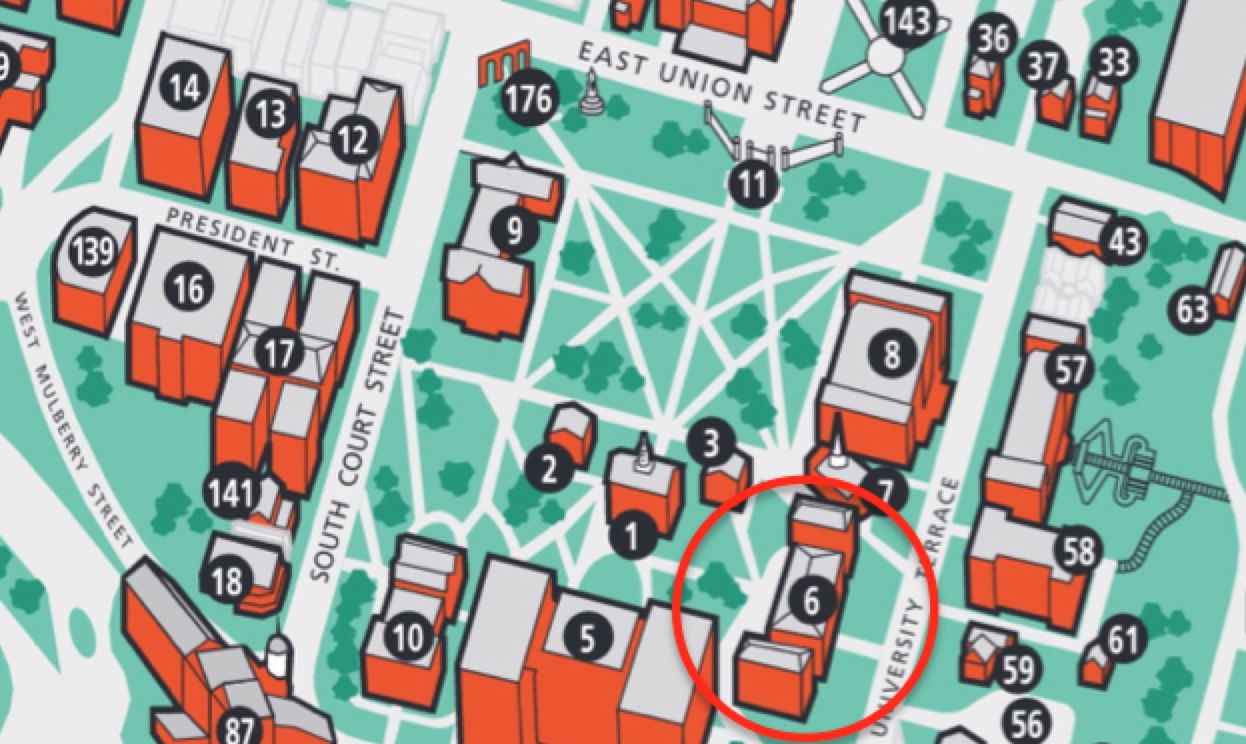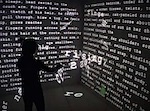|
ENG 2010
Dr. Edmond Y. Chang Download the course policies and syllabus (PDF).
"I’m open to reading almost anything—fiction, nonfiction – as long as I know from the first sentence
or two that this is a voice I want to listen to for a good long while. It has much to do with imagery
and language, a particular perspective, the assured knowledge of the particular universe the writer has created."
|
ACADEMY AWARD-WINNING Bong Joon-Ho, director of 2019’s Parasite, argues, "I have a complex feeling about genre. I love it, but I hate it at the same time. I have the urge to make audiences thrill with the excitement of a genre, but I also try to betray and destroy the expectations placed on that genre." This class, then, will explore the intersections of literature, genre, form, text, and medium to identify and play with literary (and readerly) norms and expectations, to challenge our conceptions of text and literature, and to address how each text reveals and responds to social, cultural, and historical conditions and norms, such as race, gender, sexuality, ability, and so on. This course will introduce you to the conventions and reconfigurations of prose fiction and nonfiction in order to develop a critical vocabulary and close reading practices for studying, analyzing, discussing, researching, and enjoying literature and other texts. Authors may include Sherwood Anderson, Jorge Luis Borges, Gloria Anzaldua, Amy Tan, Clarence Major, Shelley Jackson, Brittney Morris, Roxane Gay, Gene Luen Yang, and others. A REQUIREMENT for this class is a well-developed curiosity about the world, about the culture we live in, and about the cultural productions we imagine, produce, and consume. In other words, this class is about reading, critiquing, and analyzing our culture through different literatures and texts. We will engage different practices enjoying and analyzing literature and other media, as well as develop literary, feminist, and queer strategies, habits, and perspectives of reading, thinking, and writing. Foremost, we will read and research with pleasure and for pleasure. We will also close read for analysis. And lastly, we will read and deploy literature as theory, as dramatizing the concerns, wonders, struggles, and politics of lived life and experience. WE WILL spend the quarter asking and addressing difficult, challenging, and sometimes discomforting ideas, questions, and topics, focusing on different identities, bodies, histories, desires, experiences, and even struggles and violences. Whether on the page, screen, on campus, or in the community, we will explore and engage multiple perspectives, levels of familiarity with the material, and heady and heartfelt responses. In other words, our class will be a safe, respectful, but not necessarily comfortable space. While pushing boundaries and comfort zones are essential to critical thinking, making connections, and intellectual and personal freedom, see me with concerns and queries, for reasonable accommodations, and for further resources on campus. SPECIFICALLY, our course goals and learning objectives include (formal ENG 2010 outcomes are in bold):
• Students will be able to describe generic conventions, forms, and literary techniques
across a variety of prose works using appropriate literary terminology.
OUR CLASS is a hybrid course. We will meet in person on Mondays and Wednesdays, 9:40 to 10:35 AM, in Tupper 107, and Fridays will be online synchronously or asynchronously (as announced) via Blackboard. |
"Do work that matters. Vale la pena."
"You must write, and read, as if your life depended on it."
Required Course Texts & Materials
• Anderson, Winesburg, Ohio
|
|
Course Requirements
Presentation & Roundtable (20%) Download the course policies and syllabus (PDF).
|
Requirements & GradingYour grade should not be the sole exigence or motivation for this class. It is the hope of the course that you walk away from our class with something more. Find some pleasure and some edification and some knowledge from this class (or any class really) and success is usually not far behind. With that in mind, your grade will be a reflection of engagement, effort, close reading, critical thinking, writing, and participation. Critical Question Presentation and Roundtable (20%) You will be a required to sign up in small groups for an oral presentation and roundtable during the course of the semester. For your presentation, you will read the texts assigned for a particular week, summarize and articulate two or three main points from the week’s scholarly or critical text (as assigned), generate a critical question connecting the theory to the text, and contribute to in-class and online discussion for the week. Curations should have a group presentation plan, a substantive framing post, may include media, and each group member must contribute to the discussion and post. In-Class Quizzes (10%) There will be seven or more in-class quizzes at various times during the semester. These quizzes serve as a review of the week’s main ideas, terms, texts, and readings. These quizzes will include identifications, fill-in-the-blanks, definitions, and short answers. Creative Responses (10%) Not only will you be reading prose fiction and non-fiction, you will write your own to explore and demonstrate the ideas and goals of the course. Over the course of the semester, you will write a personal essay, a short-short story, and a critical review. These creative responses will be evaluated on completion and your critical, thoughtful engagement with the prompts. Critical Reflections (30%) Over the course of the semester, you will have four opportunities to complete short, analytical reflections that ask you to respond to the readings, the theoretical texts, and to assess your own work and performance in class. These reflections will be due (tentatively) at the end of Week 3, 7, 11, and Week 15. You must complete two of the four opportunities, one of which must be in the first half of the term and one in the second half. Critical reflections will be cumulative and based on the class readings, literature, other media, and in-class and Blackboard discussions. Participation and Preparedness (30%) Preparedness and participation forms a large component of your final grade. It is essential that you prepare for class, attend class, and participate. Missing class or participation may seriously compromise your ability to do well in this class. Moreover, negative participation will hurt your participation grade. Participation is determined by 1) your respectful presence in class and interactions with me and others, 2) your willingness to discuss, comment, and ask questions, 3) your preparation for class, which includes having the required materials and doing all of the assigned reading or work for class, 4) your engagement and collaboration in group work, presentations, office hours, and course events, and 5) your care and use of the class Blackboard or "Bb"—bookmark the address, check regularly, comment as required, and think of the blog as an extension of class: https://blackboard.ohio.edu/ultra/courses/_590139_1/cl/outline |
"Some of my favorite places I have been in my life exist only in dreams."
"So here is why I write what I do: We all have futures. We all have pasts. We all have stories.
And we all, every single one of us, no matter who we are and no matter what’s been taken from us
or what poison we’ve internalized or how hard we’ve had to work to expel it—we all get to dream."
|
|
|
AttendanceAttendance is required. If you are absent, you miss the explanation of an assignment, the discussion of a reading, the chance to participate, and overall, the class as a community of learning. Also, you are expected to be in class on time. In the first minutes of class I may make important announcements, establish the agenda for the day, begin immediately with an important lesson, or field questions. If you come in after we start class, even by only a few minutes, you are late and will be mark as such. Chronic or conspicuous attendance problems will negatively affect your overall participation grade for the class.
Moreover, absences for more than 21 class sessions (50% of class time or more, in person or online)
will result in a failing grade regardless of reason. All absences are your responsibility. If you
know you are going to miss class, please let me know (via email) as soon as possible and
make any necessary arrangements. When you do miss class, always find another student to
get class notes or see me during office hours in order to make up missed work in a timely
manner. You are always responsible for all material covered during your absence.
|
|
|
MLA Paper Formatting 1) 1" margins top, bottom, left, and right on each page. 2) Single-spaced block header on the first page only with your name, date, course, my name:
Student Name 3) Short, appropriate title. 4) Print single-sided. Papers are double-spaced with paper page numbers in the upper right hand corner; no extra space between paragraphs. 5) Standard Times Roman Font, 12 point only. 6) Correct MLA citation and bibliographic format. A paper turned in without a bibliography automatically fails and will be returned with no comments.
|
Assignment FormatAll papers must be typed or produced on a word processor. All documents should be saved in Microsoft Word format (or if necessary Rich Text Format). All papers must follow the manuscript format outlined by the assignment. Unless instructed otherwise, all papers must use MLA citation and documentation conventions. All papers must be neatly printed (in black), single-sided, stapled in the top, left-hand corner if necessary, and not be three-hole punched. Papers that do not follow these format guidelines will not be accepted. They will be returned unread to you. Papers will be regarded as late until they are resubmitted in the proper format. Always make a backup copy of every paper you turn in, lest you be one of the unhappy people whose paper is eaten by the computer. You may even want to take the precaution of e-mailing your paper to yourself as an attachment during the drafting process and certainly before you exit the document and leave the computer. Or you may want to invest in cloud-based file storage like OneDrive (which all OU students have already have access) or DropBox.
Evaluation RubricOver the course of the semester, your assignments will receive feedback and comments that will identify what you are doing well and what still needs improvement. Your grades assess your fulfillment of the assignment, the quality of work, detail, analysis, and argumentation, overall effort, and finally, style, polish, and risk taking. Consider the following evaluation rubric as signposts or a kind of legend to your progress and evaluation:
• Outstanding (A/A+): Offers a very highly proficient, even memorable demonstration
of the trait(s) associated with the course or assignment goal(s), including some
appropriate risk-taking and/or creativity. |
Late Assignments All assignments must be done completely and turned in on time. Late assignments will be penalized a letter grade for every day that they are late. So, if your essay is late by one day and you received a B- for your work, then your final grade would be a C-. Moreover, I will not comment on late work. However, you still need to complete late work or you will receive a zero. If you miss the due date of a paper, you must notify me and make arrangements to get the paper to me as soon as possible. Unless previously arranged, I DO NOT accept assignments via email. Remember that a paper has not been officially handed in until it is in my hands. Never turning anything in late is always the best policy. |
|
Contact Dr. Chang
Office: Download the course policies and syllabus.
|
Finding HelpMy office and office hours are listed in the left sidebar. I am available during that time or by appointment (which can be held virtually). I encourage you to come see me early in the quarter even if it is just to talk about the class, about the assignments, or about school in general. I may ask you to meet with me when I think a conference would be useful. My office is located on the third floor of Ellis Hall (east of Alden Library), Room 331.

Email is the best way to contact me. I will do my best to answer your emails and Bb posts, usually within twenty-four hours. If there is an emergency and you need to reach me, please contact the main English office in 201 Ellis Hall. Furthermore, when time permits, I will supplement my office hours with virtual hours via Google Talk (nickname: EDagogy); if I am logged in, during reasonable hours, you are more than welcome to discuss the class or ask questions. Please, when you initiate an IM conversation, please say hello and identify yourself to me; also, be patient because my responses may not be immediate. You can find additional writing and academic help at the Student Writing Center (SWC) on campus, a good resource for this class and other classes. The SWC is located in the Academic Advancement Center (AAC) on the second floor of Alden Library and offers a variety of services including help with reading, papers, brainstorming ideas, and research. See https://www.ohio.edu/uc/aac/swc.cfm to make an appointment and for more information.
Further resources, both on- and off-campus can be found on the Links page of the course website:
http://www.edmondchang.com/courses/2010/links.html.
|
Learning (With) Technology Unless you have an official accommo-dation, the use of technology in our classroom is a privilege, not a right. Mobile devices like phones, media players, and cameras should be off and put away. Computers and tablets should be used for note-taking, in-class work, and readings only. Print is generally preferred for course texts and readings, but full-size e-versions are acceptable provided the student is able to readily highlight, annotate, and index. Finally, be conscientious and respectful in the use of the course website and social media and post no material from class to the internet or non-class sites without explicit permission from the instructor and the class. Keep in mind these three rules:
1) Use the Right Tool for the situation and the task—keep it simple and elegant,
Inappropriate use and abuse of technology in class will result in the taking away of technology privileges for the offending student and/or class as a whole. |
|
|
AccommodationsAny student who feels they may need an accommodation based on the impact of a disability should see me or contact me in the first week of class to discuss their specific needs and provide written documentation from Student Accessibility Services. If you are not yet registered as a student with a disability, please contact Student Accessibility Services at 740-593-2620 or visit the SAS office in 348 Baker University Center. The SAS website is: https://www.ohio.edu/uc/sas/index.cfm.
COVID-19All students are required to abide by the university’s pandemic strategies and protocols, which are updated and outlined: https://www.ohio.edu/coronavirus. Please follow all guidelines and recommendations regarding masking, social distancing, testing and symptom reporting, and vaccination. If you have physical or mental health concerns, changes in employment, housing, or responsibilities, or face other challenges, insecurities, or problems, please seek out Ohio’s health services: https://www.ohio.edu/wellness/student-resources, counseling center: https://www.ohio.edu/student-affairs/counseling, or see me for further help, resources, or accommodations.
Academic DishonestyAll students are required to uphold the highest academic standards. Plagiarism, or academic dishonesty, is presenting someone else's ideas or writing as your own. In your writing for this class, you are encouraged to refer to other people's thoughts and writing--as long as you cite them. Many students do not have a clear understanding of what constitutes plagiarism, so feel free to ask questions at any time. For our class, plagiarism includes:
• a student failing to cite sources of ideas If you have any doubt about how to cite or acknowledge another's writing, please talk to me. Any plagiarism or academic dishonesty will result in failure of an assignment or of this course. It is always better to be safe than sorry. Please review the Ohio University's Academic Misconduct page at https://www.ohio.edu/communitystandards/academic/students.cfm
Harassment, Discrimination, and Sexual Misconduct
Ohio University and this course are committed to a safe, supportive, and inclusive learning environment.
Title IX makes clear that violence and harassment based on sex and gender is a Civil Rights offense
subject to the same kinds of accountability and support applied to offenses against other protected
categories such as race, national origin, and so on. As your instructor, I am a mandatory reporter
and am required by law to share with the University any information regarding sexual misconduct or
information about a crime that may have occurred on campus. For more information about policies
and resources or confidential reporting options, see the Office of University Equity and Civil
Rights Compliance:
https://www.ohio.edu/equity-civil-rights/
or the Division of Student Affairs
page on Student Conduct & Community Standards:
https://www.ohio.edu/communitystandards/process/sexualassault.cfm.
|
"Imagination is more important than knowledge."
"An idea that is not dangerous is unworthy of being called an idea at all."
"The point about pop culture is that so much of it is borrowed. There’s very little that's brand new.
Instead, creativity today is a kind of shopping process—picking up on and sampling things form the world
around you, things you grew up with."
|
|
|
© 2022 Edmond Chang. All original material. All rights reserved. Contact the webmaster of this site. These pages are best viewed with Mozilla Firefox or Google Chrome. Open your browser to the largest viewable area. These pages are hosted by ED(MOND)CHANG(ED)AGOGY, the academic, professional, and creative website of Edmond Y. Chang. |
|

















